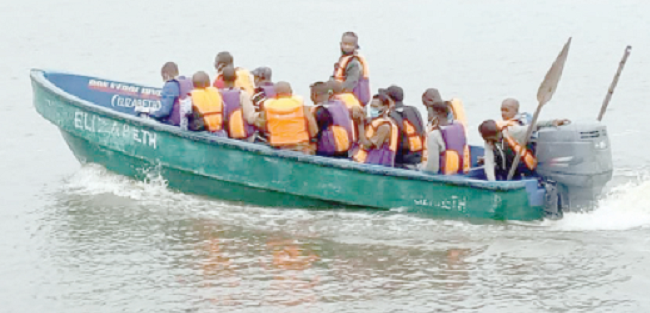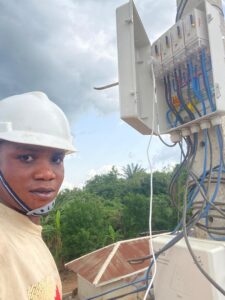How flooding puts water transportation on a knife-edge
[ad_1]
Many littoral communities across Nigeria recently became submerged in massive floods that swept away homes, farm lands and livestocks, leaving many homeless. With high water tides expected due to the floods, water transportation at this time needs to be approached with caution, writes TOLA ADENUBI
FOR littoral states like Anambra, Bayelsa, Benue, Cross River, Delta, Edo, Kogi, Kwara and Niger States, the menace of flooding has been devastating in recent weeks and months. Many communities have been swept away due to the floods that recently ravaged this littoral States, leaving many homeless and without a source of food to survive.
With the floods, high water tide is expected along these littoral States and this implies that if water transportation must continue to take place, then operators must adopt caution to ensure safety of lives and properties.
High water tide comes with its own implications, which comes in the form of increased likelihood of more logs, more wrecks, more water hyacinth along the nation’s waterways.
Release of more logs, wrecks
The massive floods comes with it attendant consequences, and major among them is the release of logs from the creeks into the waterways. Speaking recently when she hosted the leaderships and members of the Association Of Tourist Boat Operators and Water Transporters (ATBOWATON), Waterfront Boat Owners and Water Transporters Association of Nigeria (WABOTAN), Maritime Workers Union of Nigeria(MWUN), Lagferry, and other waterways operators in Lagos State, the Lagos Area Manager of the National Inland Waterways Authority (NIWA), Engineer Sarat Braimah explained that the floods must have pushed many logs and wrecks from the creeks into the waterways, so boat operators must operate with caution.
“With many logs and wrecks pushed into the waterways as a result of flooding, boat drivers must not over speed due to the implication of colliding with a floating log or wreck while at top speed. From experience, we all know that many boats have sunk in the past because of collision with floating logs or wrecks. At top speed, with passengers fully loaded in a boat, it is dangerous to collide with a floating log or wreck because such can lead to crack in the belly of the boat which immediately starts taking in water.
“And once a boat starts taking in water, we all know what happens next. The boat can get submerged in minutes depending on the amount of water coming in. We don’t want a situation where any boat fully loaded with passengers gets drowned in Lagos. The flood must have released logs or wrecks into the waterways, so operators must be cautious at this time.
“We have taken note of the possible challenges of having floods pushing out wrecks from the creeks into the waterways and we believe our ongoing wreck removal efforts will address the problem,”
With expected high water tides and incidence of floods, ravaging littoral communities around the country, the NIWA Lagos Area Manager also warned boat operators and ferry services providers to stick to extant rules of engagement, saying over-speeding, overloading and fueling while on transit will not be tolerated.
The NIWA Area Manager also warned against boarding boats without life jackets and other sundry activities unbecoming of boating rules, adding that all stakeholders must show commitment to passengers’ safety, including that of other waterway users.
More water Hyacinth
With high tides as a result of flooding, NIWA has also warned of more water hyacinth along the waterways.
“This meeting is to prepare us to be circumspect and not take chances over weather forecast and consequent high tides of Lagos waters for granted. We want you to go back to your unit bodies and members to draw their attention to the expected impact of climate change which is here with us. We cannot afford to sleep over this matter and must therefore prepare to confront it head long if it comes our way.
“We have written to request that Water Hyacinth be cleared and checked. Due to the floods, we expect to see more water hyacinth on the waterways, so boat drivers must drive with caution,” Engineer Sarat Braimah explained.
The NIWA Lagos Area Manager further assured of deploying the NIWA task force, backed by ambulance services round the clock, with proactive management of water Hyacinth which has moved upstream to the waterways, thereby posing a challenge to boat operations.
Weak Boats
The high tide occasioned by the massive flooding of most of the littoral States also comes with it the possibility of many boats struggling to maintain balance while on transit, explains the President of the Metropolitan Waterways Concepts Ltd, Engineer Lateef Adio Onikoyi
“With high tide, the current is stronger and the water is more volatile. Many debris and wrecks that have been under water might have been pushed up. It is good that NIWA is currently carrying out wreck removal exercises along some strategic parts of Lagos State waterways and this means if the strong tide pushes out hidden wrecks, such wreck will most likely be removed.
“But what about outside Lagos? The recent accident that claimed lives in Anambra State was as a result of high tide. Many lives were lost during that accident which could have been avoided if the ill fated boat, which was not strong enough to withstand the tide, had not overloaded. Due to overloading, the boat easily capsized because of high tide.
“The strength of the boats we use along our waterways is very important at this period. Many of the boats used by operators are not strong enough to maintain balance during high tide. Many of the locally made boats lack the strength to maintain balance during high tide. Flooding comes with a lot of debris and brings out hidden wrecks.
“Flooding makes the tide more volatile, and boats that are not strong enough easily get sunk in high tide. I will advice boat operators at this period to evaluate their boats because the flooding has pushed up the tides. The risk is higher at this period. Using boats that are not strong enough is a risk on its own at this period, not to talk of over-loading such boats.
“Even in Lagos where NIWA is currently removing wrecks, this does not give operators the leverage to over-speed or overload their boats at this critical period. With flooding everywhere, water transportation at this moment should be approached cautiously because we will experience more high tides.
“Many wrecks that have remained submerged for years will be pushed up and any boat over speeding could run into such wrecks unknowingly. The result can be fatal. Operators need to be cautious at this period,” the Metropolitan Waterways boss explained.
[ad_2]















Post Comment